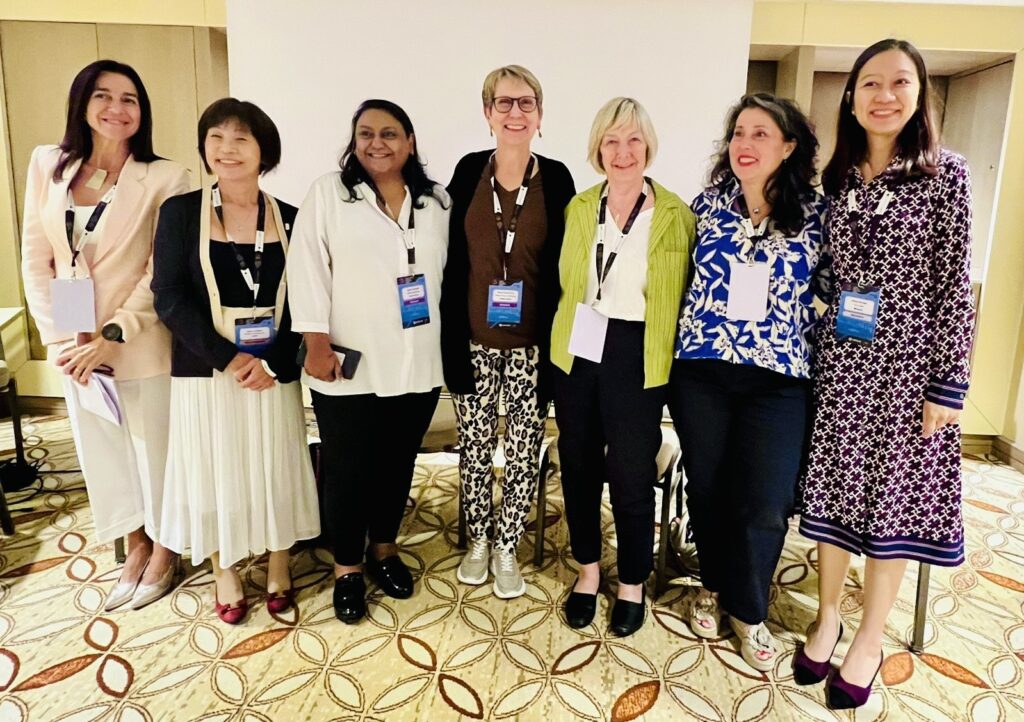
GW4W’s Co-founder Nancy Board Eruç facilitates roundtable discussion in Istanbul Türkiye entitled, “Pushing Back on Progress? – A Call to Action.” Presented at the Global Employee Assistance Summit in May 2025: Global Perspectives on Workplace Mental Health & Wellbeing. Advancing Minds Together.
This session emerged in response to the growing backlash against Diversity, Equity, and Inclusion (DE&I) initiatives, policies, and programs — a pushback that is increasingly visible among government officials and business leaders in the U.S. and around the world. This resistance threatens to erode hard-won progress on gender equity and poses even greater risks to LGBTQIA+ and BIPOC women and communities. Yet, despite these challenges, employees are raising their expectations, leaving workplaces in record numbers to seek the change they deserve.
Nancy Board Eruç convened a global panel of passionate changemakers in Istanbul, Türkiye, to share insights, best practices, and actionable strategies to keep moving forward. The panel featured six accomplished women with collective work experience spanning over 30 countries, and with audience participation, experiences from 35 countries were represented in the forum.
Together, this roundtable amplified stories and perspectives that too often go unheard, highlighting actions driving progress across the globe. The discussion centered on how to safeguard the gains already made, push for further change, and prioritize personal wellbeing as a foundation for supporting marginalized communities and empowering the next generation of female leaders. Though change can seem elusive at times, these contributors brought stories of determination and courage to the global discourse on workplace wellbeing.
At its heart, the session underscored the power of collaboration across borders to build resilient mental health ecosystems. And it also highlighted the importance of resilience, solidarity, and wellbeing as catalysts for change.
Across regions and cultures, participants acknowledged the ongoing tension between progress and entrenched institutional barriers — and shared practical steps that are improving women’s lives and livelihoods every day.
What follows is just a glimpse into the many challenges and triumphs unfolding in workplaces and communities around the world. Our work is far from finished—but together, our impact continues to grow. Join us in amplifying the voices that need to be heard.
Kate Nowlan, Strategic Advisor and former CEO, CiC, UK
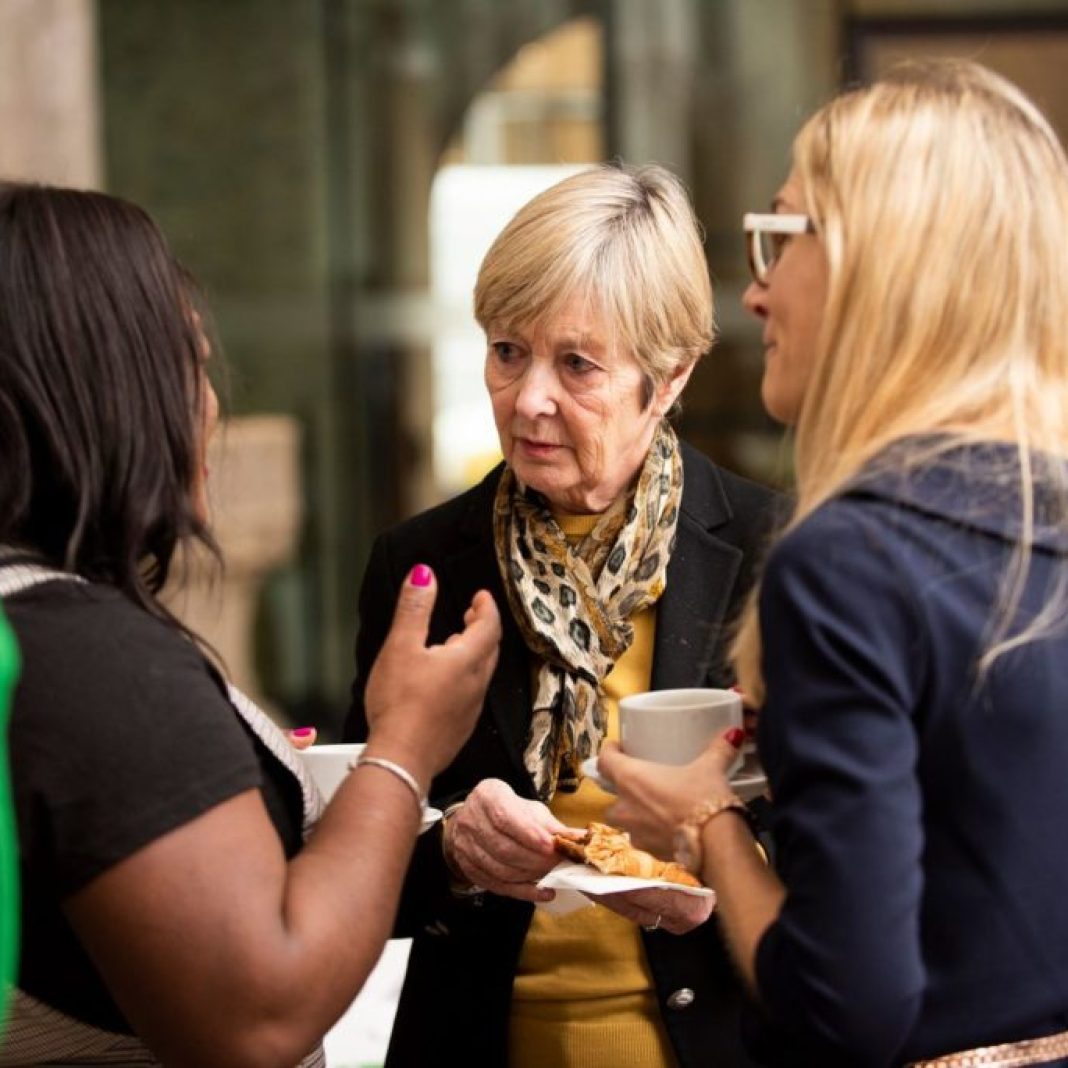
“Let the World Know” – A Focus on Afghan Women
As a senior advisor to global media organizations that cover stories of those living and working in high conflict zones, Kate and her organization, CiC support many non-governmental organizations (NGO’s), government entities and journalists who report on causes where female representation is virtually non-existent.
As women in Afghanistan are stripped of their rights — banned from education, barred from public life and rendered invisible — a number of women journalists continue to report from inside the country. They do so anonymously, at great personal risk and often without knowing the identities of their colleagues.
In a session titled Breaking the Silence, hosted by Thomson at the International Journalism Festival 2025 in Perugia (Italy), Afghan journalist Zahra Nader from the Zan Times was present in Perugia along with Zahra Joya who spoke about the conditions women and girls face under Taliban rule and the quiet determination of her team at Rukhshana Media, a newsroom founded to tell the stories of Afghan women. “Being a woman in Afghanistan is like being a second-class citizen, or worse,” said Zahra. “Female journalists work in silence and undercover. Women cannot leave home without the escort of a male family member or spouse. Women that live alone cannot leave their homes or go out to even shop for necessities without a male escort.“
“We are not allowed to go to school, to work, to travel alone. Women in Afghanistan are completely invisible. There is no schooling after the age of 12 for girls now under Taliban rule. This is referred to as ‘gender apartheid.’ There is extreme trauma and suffering. Let the world know what is happening to us. Hope is our power.”
Kate was granted permission by Afghan journalists to tell their story.
Dear Kate,
Thank you so much for today’s conversation. I truly appreciate the space and attention you gave to our work in Rukhshana Media. I want to emphasize how vital it is to listen to the voices of Afghan women right now.
What’s happening in Afghanistan under Taliban rule is devastating, especially for women and girls. There are over 80 official decrees issued by the Taliban that effectively criminalize almost every aspect of women’s public and private lives, including education, work, movement, and dress.
The so-called “Ministry for the Promotion of Virtue and Prevention of Vice” enforces these rules with fear and violence. Yet Taliban representatives and their supporters continue to spread misleading narratives to the international community, claiming that conditions are improving or that their restrictions are exaggerated.
It is extremely painful and confusing to read articles like this one, which paint a picture so far removed from what we, as Afghan women, know and live through. Who should we believe, those enforcing these repressive laws, or those suffering under them?
I ask only that the world listens more carefully to the women of Afghanistan, whose testimonies are too often ignored or slienced.
Warm regards, Zahra
Zahra Joya from Rukhshana Media (based in the London, UK) – “We refuse to be erased”: Zahra Joya on the women reporting under Taliban rule
Zahra Nader from Zan Times (based in Edmonton, AB) – Why I Support LGBTQ Rights and
Afghan Women: The Largest Imprisoned Population in the World
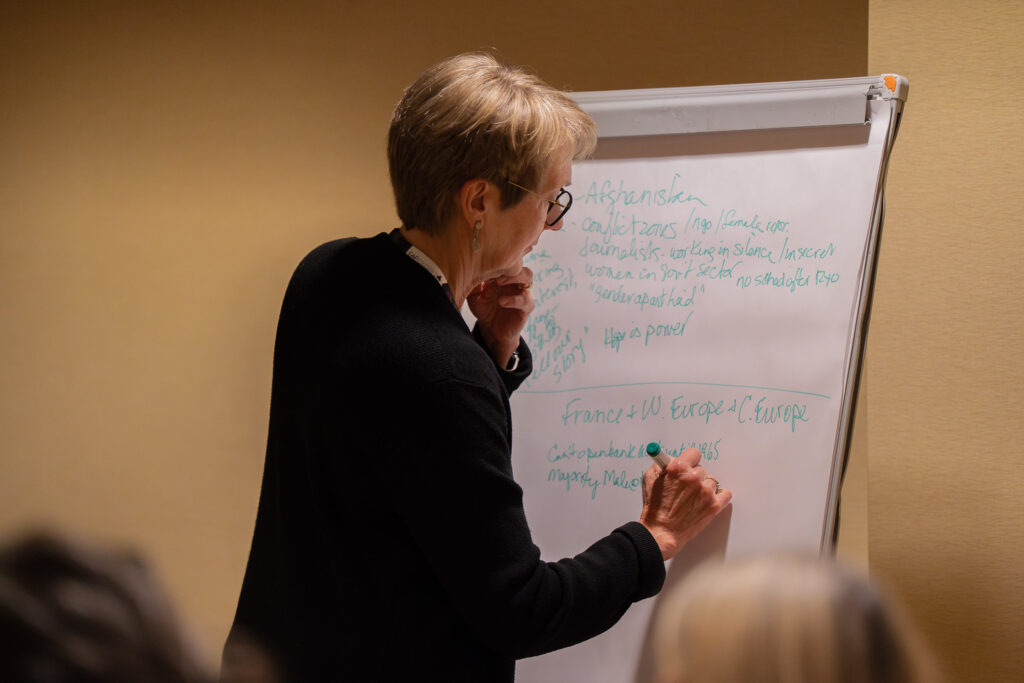
Nancy Board, GW4W
Brigitte Vaudolon – CEO, PULSO France and Anne Giesen – Country Manager, Netherlands

Wide Gaps in Gender Equality & Progress in France and the Netherlands
Brigitte began her remarks by pointing out some facts about women at work in France and in consultation with the Pulso Group teams in the Netherlands.
“In France, a common notion about women rights is that we are doing just fine, yet some basic rights for women are very new. For example, women were not allowed to work and open a bank account in France without their husband’s approval until 1965!”
As of 2023, the employment rate for women in France stands at 68% for the 15–64 age group — a historically high level, yet still lower than in countries like Germany (76%) or the Netherlands (74%), but well above Greece (55%). Among women aged 25 to 49, the employment rate exceeds 82%, reflecting their central role in the workforce.
Since the 1970s, France has seen major legal advances promoting women’s economic independence, such as the right to work without a husband’s approval (1965), as well as stronger work/family balance policies. Yet despite this progress, the gender pay gap remains at around 15%. To address this, France introduced the Gender Equality Index in 2019, requiring companies with over 50 employees to publish an annual score based on multiple indicators (pay gaps, promotions, return from maternity leave, etc.). Regarding corporate leadership, the Rixain Law (2021) mandates 30% women in executive committees by 2026, rising to 40% by 2029.
While significant progress has been made, true parity — especially in strategic roles — is still a work in progress. (Sources: INSEE, Eurostat, ministère du travail, parlement européen). Though even with progress and time, still today, the majority of organizations are led by men. Women have improved in managerial ranks but continue to bump up against a glass ceiling. Women still earn less than men with similar positions and titles. They still face sexual harassment and domestic violence concerns at work.
Recently the EU Commission developed an equality index, and they are beginning to measure equity in organizations. Though this is a positive achievement, women still face violence, reduced pay, and continue to take on most of the caregiving responsibilities at home beyond paid work hours. Their emotional and financial wellbeing is greatly impacted.
Wellbeing Challenges Among Dutch Employees
In recent years, the Netherlands has positioned itself as a country with progressive workplace practices, yet data shows that significant wellbeing challenges persist among all employees. These challenges are complex and interconnected:
- Mental health remains a major concern.
- Supervisor support and psychological safety are inconsistent.
- Financial stress undermines overall wellbeing.
- Burnout and work-Life imbalance are on the rise.
The Dutch labour market is often regarded as progressive, yet gender equality remains an ongoing challenge. Disparities in leadership representation, the persistence of the part-time work culture, and unequal caregiving responsibilities continue to impact women’s careers and wellbeing.
Fortunately, the Netherlands has taken meaningful steps toward improvement, through legislation, public-private initiatives, and the emergence of strong female role models.
Legal reinforcement has come in the form of the Dutch Board Diversity Quota, which was introduced in 2021. It obliges large companies to appoint at least 30 percent women to supervisory boards and set their own targets for management positions. While quotas can be controversial, from a behavioural science perspective, they help overcome structural bias and catalyse cultural change at scale.
Another key initiative is parental leave. As of 2022, both parents are entitled to nine weeks of paid leave at 70 percent of their salary. This policy represents a significant shift toward shared caregiving, which in turn supports a more equitable distribution of professional opportunities and workplace participation. Research shows that equal parental leave policies are associated with higher employee satisfaction, reduced burnout and long-term retention.
Cultural change also starts early. The national alliance “Becoming Who You Are” focuses on challenging gender stereotypes in education and career orientation. Through the use of diverse role models and early exposure to technical and STEM careers, this initiative works to shift expectations and broaden career ambition among girls. Longitudinal studies have demonstrated that early intervention plays a critical role in improving future employability and economic independence.
Beyond policies and programmes, representation matters. The Netherlands is home to a number of inspiring women whose leadership transcends sectors. Elvire Jaspers, a thought leader in ethical AI and co-founder of WeAreBrain, champions gender equality in tech. Jalila Essaïdi, founder of BioArt Laboratories, bridges science, art and entrepreneurship to tackle global challenges. Sigrid van Aken, as CEO of the Postcode Lottery Group, leads one of the world’s largest charitable donors with purpose and visibility.
Each of these elements, legal frameworks, institutional initiatives, inclusive policies and visible leadership, contribute to a stronger, more resilient organisational culture in which women can thrive. The key now is to integrate these insights into everyday workplace behaviours, supported by systems that measure their impact on wellbeing, leadership development, and long-term inclusion.
Driving Structural Change for Women at Work
Topvrouwen.nl and Talent to the Top are two standout initiatives driving structural change. Topvrouwen.nl curates a national database of qualified female candidates for executive and non-executive board positions. Talent to the Top, meanwhile, invites organisations to commit to concrete gender diversity targets and publicly report on their progress. Both initiatives are designed to increase visibility, accountability, and action.
Companies are more open to part time jobs and 4 days / week schedules. Men and women can and do work part time, and it’s still possible to get a good job and be promoted. Additionally, gender equality and sensitisation awareness on women’s health issues such as breast cancer, menopause & perimenopause, sleep and prostate cancer (in men) is gaining traction.
As a result of more progressive social initiatives, the Netherlands ranks among the top European countries for gender equality and is widely regarded as a model in this area.
Ellisha Othman, Managing Director & Clinical Psychologist, Thrive Well – Kuala Lumpur, Malaysia
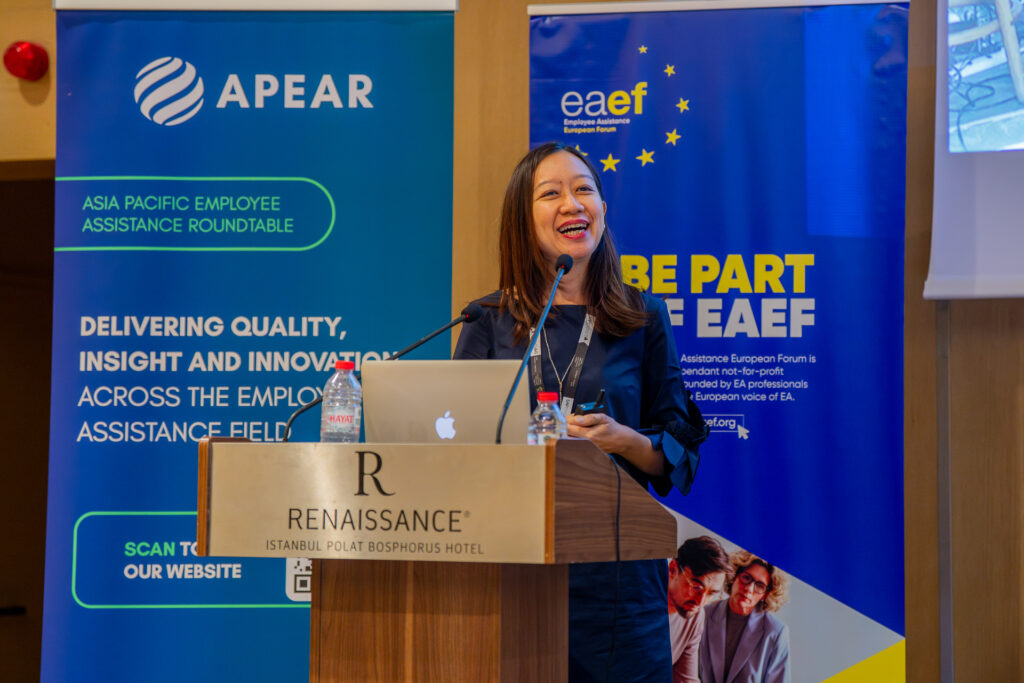
Reports from Malaysia and Southeast Asian Countries – The Need for Employer Advocacy
According to the ASEAN Gender Outlook 2024, UN WOMEN report, women in southeast Asia:
- Are more likely than men to live in extreme poverty
- Hold only 22% of seats in national parliaments
- Spend more than double the time men spend on unpaid care and domestic work
- Are more likely to lose their jobs due to impact of climate change
- Across the region are more likely than men to face food insecurity
- Spend more than double the time men spend caring for their families and doing domestic work (3-5 hours per day, non-paid work)
- Have more equality at work but still inequality at home.
Anecdotal Evidence from On the Ground
-30% of people are living in rural areas where access to services is difficult
-Sandwich generations are common
-Women in leadership hold multiple positions but without much support
-Workplaces & government don’t provide many benefits (childcare, flexible working arrangements, allowances, 3 months maternity leave; 1-week paternity leave)
-Limited care for ageing – for elderly; they are also dependents
How Do We Break Down Barriers to Change?
-Systemically – incremental changes towards more support (maternity + paternity leave) – requires political will – shifting focus to prepare
-Higher women representation on boards – groom talent (30% club) – find stats – will be able to influence policies, operations, catalyzing a care economy
-Companies – job crafting to suit the needs of each employee – flexible working arrangements
What Actions Can We Take to Move Progress Forward?
-Target the leadership of company’s so they can advocate up (to government) & make changes down (company operations)
-Company policies – advocating & consulting
-Highlighting issues to male leaders – alerting them that so much of the mental load is taken on by the women – and getting their buy in for change
-We need male allies in positions of power to understand the importunate – (TS Wahid Omar as Bursa Malaysia Chairman)
-Need for enhanced sharing of responsibilities between women and men
-Affordable public care services
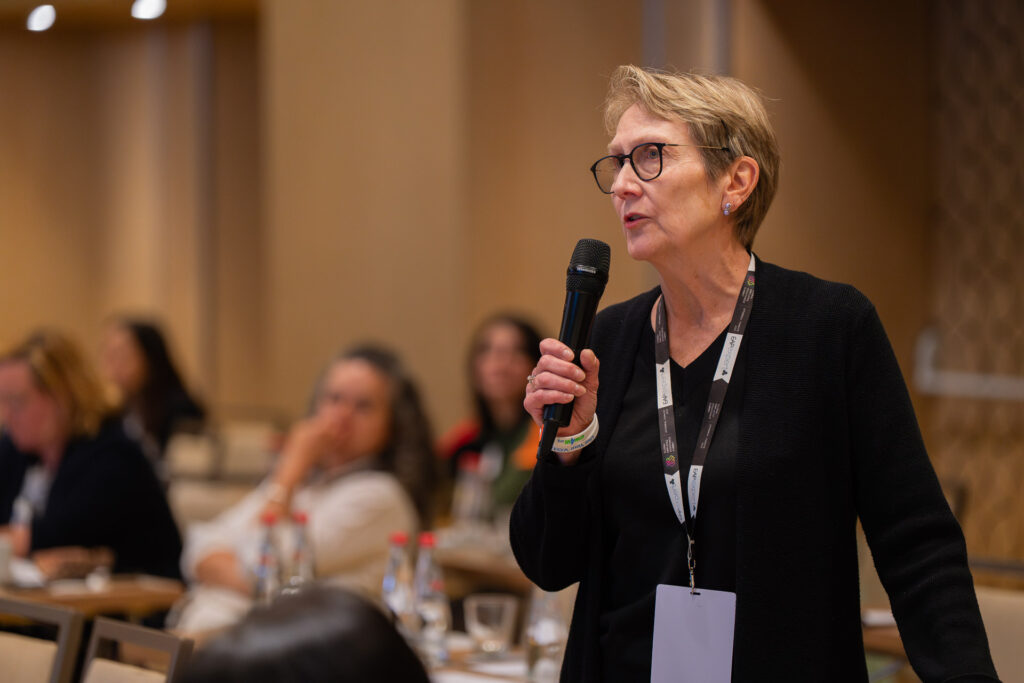
Nancy Board, GW4W
Andrea Lardani, Managing Director, Grupo Wellness Latina, Buenos Aires, Argentina and coverage for 18 LATAM countries.
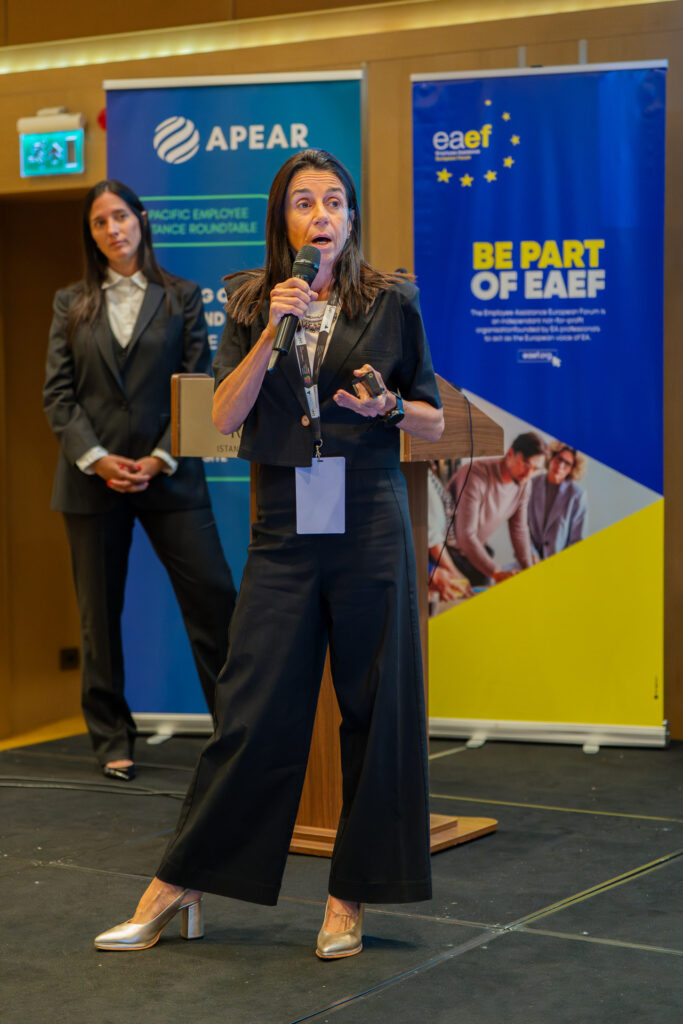
Gender Based Violence Remains Prevalent in Latin America (LATAM)
In 2024, Latin America experienced significant pushbacks on gender equality, characterized by political attacks on gender policies. Anti-Feminist and misogynist discourses appeared in some countries, such as in:
- Argentina: President Javier Milei dismantled the institution responsible for gender policies. He also cut the budgets for the public gender-based violence (GBV) hotline by 25% and for the “Programa Acompañar” by 80% – a program that provides financial and psychosocial support to victims.
- El Salvador: President Bukele removed gender education from public schools in February 2024, citing opposition to “gender ideology.”
- Peru: The Congress rejected legal recognition of gender identity and same sex marriage. The Ministry of Health issued a decree classifying trans-sexualism as a mental health issue.
Latin America Continues with High Rates of GBV. Femicides Remained a Critical Issue in 2024
- Up to 76% of women have experienced some form of GBV in their lives.
- According to the Economic Commission for Latin America and the Caribbean /ECLAC 11 femicides take place per day, or roughly one every 2 hours.
- In the UN Women 2024 report, severe online attacks took place against women with public voices (e.g., journalists, activists) in 15 Latin American countries, including Argentina, Brazil, and Mexico, impacting freedom of expression.
- Impunity / weak justice systems: Impunity remains a significant barrier. In Mexico, less than 3% of femicide cases are prosecuted, with only 1% resulting in convictions. In El Salvador, 75% of GBV cases never reach court. Underreporting remains high.
- Cultural Norms remain a barrier. ‘Machismo’, deeply rooted in Latin American society, reinforces gender stereotypes that normalize male dominance and violence.
- Patriarchal cultural patterns limit women´s autonomy (mostly in rural areas).
Persistent Structural Inequalities that Contribute to Slow Progress
- 1 in 4 women lack their own income, compared to 1 in 10 men.
- Unpaid work: women continued to spend at least double the hours that men did on unpaid domestic and care work (in some countries 5 times more)
- Women face a significant “child penalty” with labor force participation and earnings dropping to 20% and 40% (men had no declines).
“Too many women are still dying all over LATAM due to gender-based violence (GBV). As EA and workplace wellbeing experts, we are providing more support to managers andemployers about the issues they face surrounding gender violence and how to recognize the signs, better support women, and educate their workforce about GBV.”
Progress and Action Steps in 2024. Initiatives Focused on Education, Community Involvement, Leadership and Survivor-Centered Approaches
- 19 countries in Latin America and the Caribbean have laws penalizing femicide and 14 have comprehensive laws addressing Gender Based Violence (GBV).
- UN Women and the Belém do Pará Convention’s (Inter-American Convention on the Prevention, Punishment, and Eradication of Violence Against Women) issued guidelines to strengthen femicide prevention, though adoption is slow.
- In Chile – A new law called the Ley Karin (Law 21.643) became effective August 2024 which strengthens workplace harassment protections, requiring prevention protocols and investigations. This law was named after Karin Salgado, a nursing technician who took her life in 2019 due to workplace harassment. The law aims to ensure safe, respectful, and dignified work environments. The law mandates gender perspectives in labor relations aiming to address inequalities and protect all workers, including men, women and diverse identities. The law seeks to foster a cultural shift towards violence free workplaces, emphasizing prevention, worker´s dignity and mental health. It strengthens protection by recognizing single acts of harassment and psychosocial risks, making employers accountable for maintaining safe environments.
- The Inter-American Development Bank (BID) launched a program called “BID Cuida” that offers financial support to private and public childcare and elder care facilities and developments. This will generate new jobs and reduce unpaid work generally performed by women (Brazil, Uruguay and Colombia have requested the funds).
- And in Mexico, its first female president was elected, Claudia Sheinbaum
Working Collaboratively with Employers Demonstrates Value
Grupo Wellness Latina (GWL) have been supporting organizations with specific GBV prevention efforts and other support for working women for many years. For example, GWL offers maternity and breast-feeding counseling as part of their EAP offering, somewhat unique in the EA services global marketplace.
And partnerships with their employer clients create better value all around. For instance, a global cosmetics company with a 98% female workforce are a low income and vulnerable population with poor family networks (Argentina, Peru, Mexico, Colombia and Chile). Andrea states that, “At the moment an employee contacts us for EA services, our intake staff use protocols to assess the level of violence that one may encounter. Having resources available at no cost to the employee connects them immediately with education, awareness and support. Our team is available to gently assess an employee’s distress and in that initial contact, screen for violence and vulnerability.”
In another example with an employer based in Puerto Rico, co-workers suspected that a colleague was experiencing GBV. Management received consultation and further training from GWL staff on how to address the concerns and talk with the employee at risk. As a result, this employee accessed the EAP for support. GWL is also supporting organizations in Chile that are implementing changes to comply with the new Ley Karin law and manage cases that call for the reporting of sexual harassment, discrimination, bullying or racism. One organization asked GWL for support with their DEI program to expand on these initiatives. Using the Workplace Inclusion
Scale (WIS) developed by Chestnut Health Systems in the U.S., they have an evidence-based tool to better measure their impact and effectiveness.
The nucleus of the WIS centers on eight key themes: trust, value of individual attributes, personal work engagement, access to opportunity, fair rewards, cultural responsiveness, respect, and social acceptance. These concepts are measured by validated questions on a Likert scale ranging from 1-5. – Journal of Employee Assistance | 1st Quarter, 2022
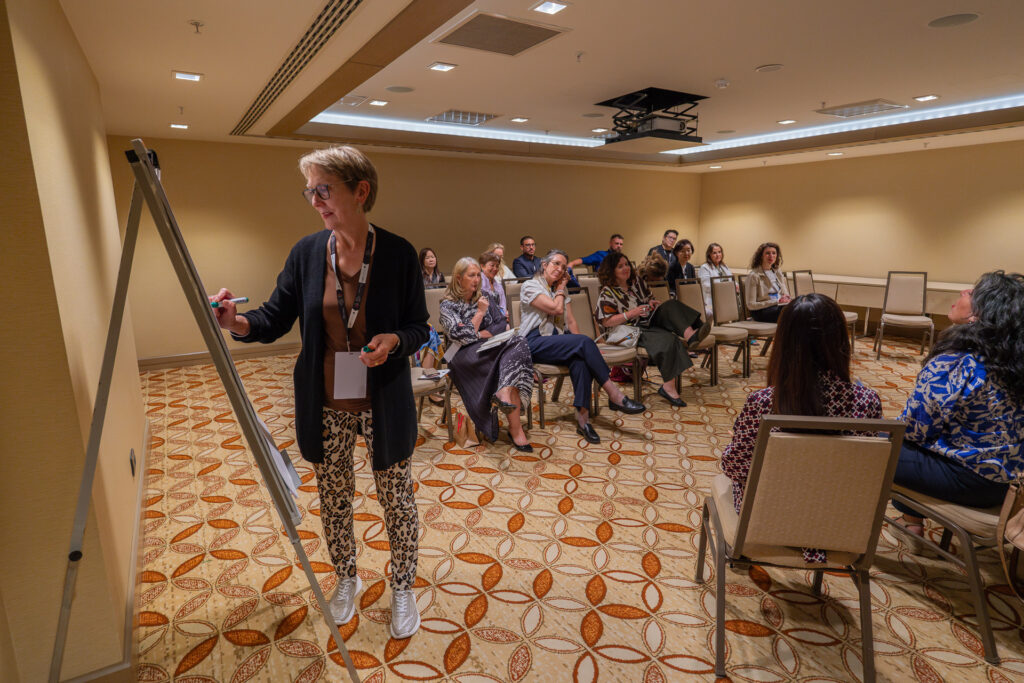
Nancy Board, GW4W
Dr. Kaoru Ichikawa, CEO Resilie Laboratories, Inc. – Tokyo Japan
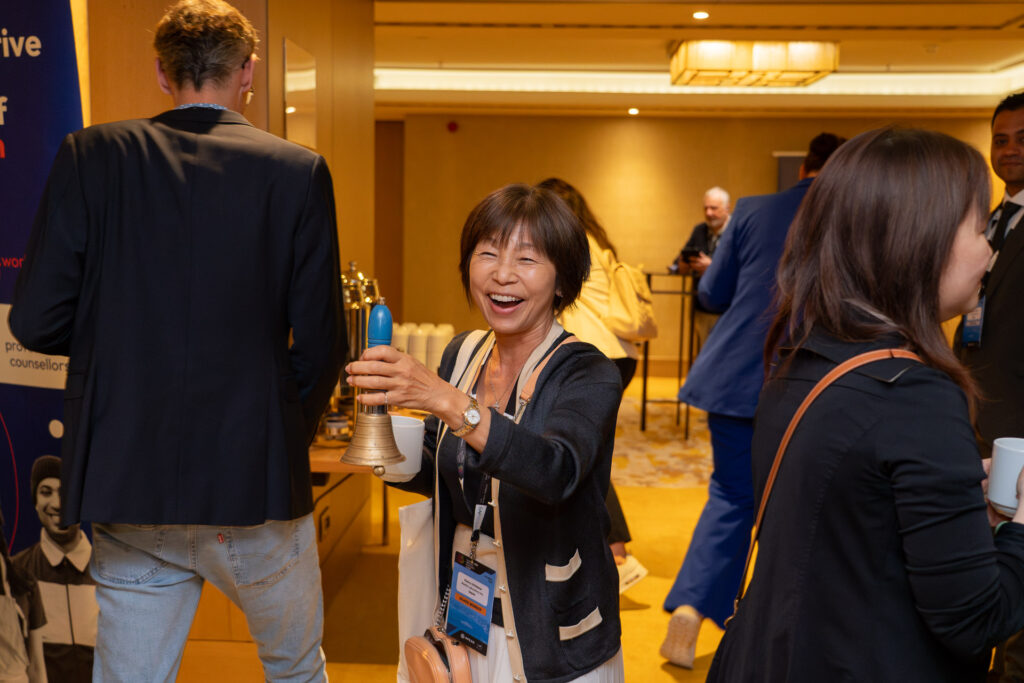
Millennials, Dual Earning Couples and More Women at Work
Dr. Ichikawa began her remarks by level setting Japan’s historical perspective on gender and work. Still a very patriarchal society, Japan struggles with an aging population, and therefore NEED more women to join the workforce. In 2016, the government created an ‘Act on the Promotion of Women’s Active Engagement in Professional Life’ also known as “More Women at Work” Act to encourage and engage more women to work.
Though these efforts may have attempted to increase the ranks of women joining the workforce, only 10% of the workforce have female managers or a higher rank. The workplaces still need more women. As of 2023, all publicly traded companies must report to the federal government the percentage of women managers who are in their workforce. Avoiding shame is a big motivator in Japanese culture. So many corporations are striving to increase female managers.
“We as EA professionals are asked to provide support and training for managers, so they are better equipped to support their female employees and couples too. And more recently, unconscious bias training, which was introduced by Harvard University, became quite popular in Japan in order to have male executives become aware of their gender bias. We are also providing unconscious bias training to help bring inequities at work to the forefront.”
Millennials at Work
Japan’s workplaces today are attracting millennial dual earning couples, and they are more open to counseling, particularly couples/relationships counseling than ever before. These young couples are raising children, are both fully engaged in their careers and are trying to better balance their work and family lives.
The Ministry of Health, Labour and Welfare of Japan conducted research on Millennial couples with children (Those born between 1980 – 1995, now 30 to 45 years old). Working millennial mothers’ primary concern in their careers is getting “mommy tracked.” Mommy Tracking is when new mothers return to work to face slow career advancement, lower pay, and fewer leadership opportunities.
Findings from a survey on 4000 working millennial men and women with children in Japan in 2022 indicate:
- Women who did not actively pursue opportunities were sidelined. But those who requested challenging tasks from their managers found their way off the mommy track.
- For dual career households, where both parents are career minded and mutually supportive, mommy tracking decreased.
“We provide consultation and coaching for managers on how to better support their female employees to help grow them into managers. And at home, the EAP can provide counseling to couples to help them become aware of their ‘unconscious bias,’ and to better balance their new roles as working parents, which is different from their parents’ generation. These are new challenges for us in Japan.”
References:
An Investigative Study on the Career Orientation of Millennial Parents in Dual-Career Households. The 21st Century Foundation for Career Development (a public interest incorporated foundation) (2022). https://www.jiwe.or.jp/research-report/2022.
Act on the Promotion of Women’s Active Engagement in Professional Life. Ministry of Health, Labour and Welfare. 2022. https://www.mhlw.go.jp/stf/seisakunitsuite/bunya/0000091025.html
Radhi Vandayar, People Engagement Consultant, ThruVision Consulting – Johannesburg, S. Africa
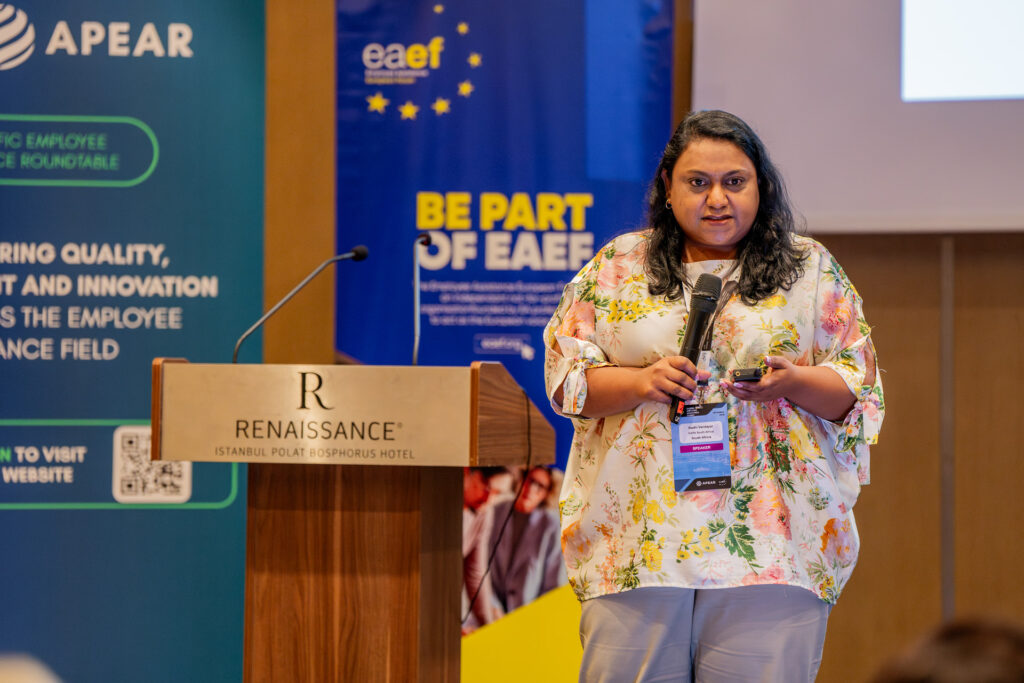
South Africa In Great Need of Positive Female Role Models
Corporations are built on a military, patriarchal model, apartheid history, and systems of migrant labourers. But since 1994, with a new constitution and Bill of Rights, changes began to take shape. However, there are few if any role models at work for women. According to Radhi: “We cannot follow a different male leadership model; we must create our own way as women in leadership.”
As women begin to have a seat at the corporate table, there is the question of “You may have a ???” — which highlights the ongoing barriers and perceptions about women’s leadership capacities.
The glass ceiling remains a significant challenge, with invisible barriers such as gender bias, unequal opportunities, and societal expectations continuing to impede progress.
In South Africa, these barriers are compounded by historical inequities, cultural norms, and economic disparities, making the journey toward equality even more complex. Creating space for
women to thrive requires deliberate action, mentorship, and policies that promote diversity and inclusion.
“Breaking the glass ceiling isn’t just about individual achievement — it’s about transforming corporate cultures and societal perceptions to genuinely recognize and embrace female leadership. Only then can South Africa unlock the full potential of its women and create resilient, inclusive organizations that reflect the diverse fabric of the nation.”
Radhi notes that many women who want to take that critical step up into leadership often grapple with imposter syndrome — the persistent feeling of not being good enough or qualified enough to lead. This inner doubt can hold talented women back, reinforcing the very barriers that the glass ceiling signifies.
To overcome this, organizations and individuals must foster environments that build confidence, provide mentorship, and actively celebrate women’s successes. Recognizing and challenging these self-doubts is essential — women must believe in their own capabilities and understand that they deserve a seat at the table.
Finally, Radhi encourages women to embrace their strengths, seek support, and push past these mental barriers, reminding us that leadership often requires taking that leap despite the fear. As we work towards genuine gender parity, dismantling imposter syndrome will be key in empowering more women to step into their full potential.
Insights Represented in this Roundtable by Country
- Afghanistan
- Argentina
- Australia
- Bolivia
- Brunei
- Cambodia
- Chile
- China
- Costa Rica
- Dominican Republic
- Ecuador
- France
- Germany
- Greece
- Guatemala
- Honduras
- India
- Japan
- Laos
- Malaysia
- Mexico
- Myanmar
- Nicaragua
- Panama
- Paraguay
- Portugal
- Singapore
- South Africa
- South Korea
- Taiwan
- Timor Leste
- United Kingdom
- United States
- Uruguay
- Venezuela